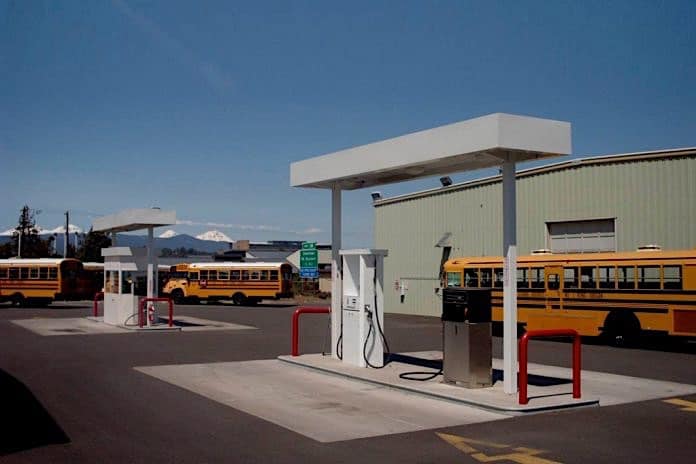A recent School Transportation News magazine survey found that over half of readers responding are suddenly paying $1 or more per gallon of fuel than last year at this time. In some places, prices have risen that much in the past month.
As fuel imports from Russia have ceased since the county went to war with Ukraine, prices have ballooned, and many school districts have been forced to use funds for fuel that they had other plans for.
“We have a saying in the fuel industry that when prices increase, they rocket up. But when they do come down a bit, it’s much slower, like feathers floating to the ground,” commented Megan Boutwell, president of transportation fuel consulting firm Stillwater Associates.
Other school districts are able to weather the storm because they have contracts in place with locked-in prices. But those with their heads still above the fuel line are doing so because they have embraced alternative sources. The price of bulk propane has increased as well, but it has remained relatively flat compared to diesel, according to the U.S. Energy Information Administration. The most recent data through March 7 shows a national average of $1.762 per gallon, though still a 61 percent increase from a year ago.
Meanwhile, the price is double for bulk diesel. For example, the Greenville Department of Public Works in Tennessee was paying $3.48 per gallon for diesel and $2.53 per gallon for gasoline as of last Thursday, reported The Greenville Sun.
Jim Ellis, transportation director for Henrico County Public Schools in Virginia, said that his procurement plans had to change as diesel fuel increased by $0.77 per gallon this month. “Here in Henrico County, there is more money in the fuel account than we usually use. I was looking at other items that money could buy that the department needed, but the fuel increase put a dent in those plans,” Ellis admitted.
In previous years, the estimated fuel needed by Ellis’ fleet of 627 buses for March through June was about 450,000 gallons. “So, every dollar increase per gallon is almost half a million dollars,” he explained. “We have a contingency plan if we go over, and it’s good that our transportation department is part of a county system. All the county vehicles fuel is from the same budget, so we do get a little discount that way and there are several places throughout the county to fuel up our buses.”
In Boutwell’s hometown of Portland, Oregon, she said many propane school buses are now on the road, when in the not-too-distant past they were powered by diesel. And the use of renewables is also increasing.
“A cool fact is that renewable propane is a product from the renewable hydrocarbon diesel process,” Boutwell pointed out.
Stephen Whaley, director of autogas business development for the Propane Education & Research Council, said many propane providers will include a fueling tank station and fuel when school districts enter a contract with a locked-in price.
He noted there are currently 22,000 propane buses in operation at 1,000 school districts across the U.S. “[Federal] infrastructure money is going to put another 10,000 propane buses on the road. When you look at a new diesel bus, it’s $100,000, and a new propane bus is $106,000. It’s kind of hard to justify a $350,000 electric bus, unless someone is buying a few for you, but then they want you to buy the rest on your own.”
According to study performed by the Center for Alternative Fuels Engines and Emissions at West Virginia University, where researchers uncovered VW emissions scandal, a propane school bus emits 96 percent less oxides of nitrogen (NOx) with a propane bus compared to a comparable diesel bus.
Cautiously Optimistic
Not everyone has the space or time necessary to erect an alternative fuel facility. In the Salem-Keiser School District in Oregon, Transportation Director T.J. Crockett said that his fleet is already running very efficient routes to try and abate fuel costs.
“I hope we’ve hit the plateau on fuel prices,” Crockett said. “I think the last time we went through this was in 2008, before I was director here, and we had to reallocate money in the budget. That was a long-term problem. I only have space here for diesel and gas tanks, there’s no room for other fuel on the property. We can’t pivot to propane, and even if we could, it’s not a quick fix with lead time on buses and building a fueling station. We’re cautiously optimistic, and we’re just going to weather this storm out and hope the prices settle back down.”
Crockett said he and his staff are attempting to build reserve funds by not spending money on projects that they’d planned on. “In general, for school funding right now, we have a little bit of breathing room with the funding we got due to COVID relief, so there is a bit more money than when we were just state-funded,” he added.
Related: Cummins Heralds the Advent of Fuel-Agnostic Engines
Related: Propane Advocates Discuss Benefits of Propane-Fueled School Buses
Related: The Big Deal About NYC’s First Electric School Buses Being Diesel Repowers
Related: Transportation Directors Weigh Pros and Cons of Alt-Fuel, Electric School Buses
Rising fuel costs are also a concern of non-traditional student transportation service providers. “We are certainly aware of the fuel issue and taking action We are offering a lot of incentives and opportunities for Care Drivers to earn more to help compensate for increases in gas prices,” said Miriam Ravkin, senior vice president of marketing at transportation network company HopSkipDrive.
Meanwhile, ALC Schools is continuing to work closely with its school district partners to navigate changes as they happen, commented Megan Carey, the company’s chief development officer. “We know they face the same issues that we do, and we also believe that as we face them together, we will be able to find creative solutions,” she said.

















